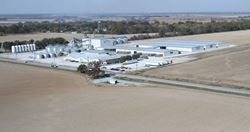|
Cache River Valley Grows The Midsouth
TERRY SIMMONS
CASH, ARK.
When farmer Joe McAlister of Cash, Arkansas began cleaning seed in 1961, he likely never foresaw that he was creating one of the largest and most successful seed companies in the Midsouth, but that’s just what he did.
Originally named McAlister Seed Service, Cache River Valley Seed (CRVS) operated through the 1960s and into the early 70s as a custom seed cleaning company for local producers. In 1973, Randy Woodard, a student at Arkansas State University, went to work for McAlister part-time while working on his degree. During that time, Woodard met, fell in love with and married McAlister’s daughter Cindy. After graduating from ASU, Woodard went to work full time at CRVS and began turning what had been a mom-and-pop custom seed cleaning business into the large wholesale and retail seed company it is today.
Woodard, a Kennett, Missouri native, began selling CRVS retail products in the Bootheel of Missouri and Eastern Arkansas, and gradually broadened the company base by expanding into wholesale seed sales to co-ops and other dealers.
Today, CRVS sells rice, soybean and wheat seeds across the entire state of Arkansas, East Missouri, North Louisiana, West Tennessee, Mississippi and parts of Alabama.
Cache River Valley Seed brands include MorSoy soybeans, HALO soybeans and Dixie Wheat with “McAlister” being their number one variety.
Much of the seed CRVS sells is grown on their own farms, but they also contract with over 70 farmers in the Midsouth area. For seed, CRVS producers raise about 5,000 acres of wheat, 5,000 acres of rice, and 35,000 acres of soybeans.

Seed that is cleaned and processed at Cache River Valley Seed plants more than 1.3 million acres.
Marty Eaton, General Manager of CRVS, says that once the seed is harvested it is brought to the processing facility in Cash where up to 80,000 bushels can be stored onsite. Once the first rice is dry enough to be cleaned, CRVS’ 35 employees begin 24/7 operations that run through the rice crop and into soybeans, and then reduces to 24/5 operations in late winter and spring. Soybean cleaning runs through Mayand into early June and finishes up just in time for seed from the wheat harvest to begin coming in.
Eaton says that the company only has a few weeks in August to clean the facility, do equipment maintenance, and get any upgrades in place before it’s time to start again.
Even with all that hard work Cache River Valley Seed finds time to support their community in many ways including providing Joe McAlister Academic Scholarships at Arkansas State University, the University of Arkansas, and the University of Arkansas (Monticello). ∆
TERRY SIMMONS: Contributing Editor/Farm Director at Ag Watch Network
|
|